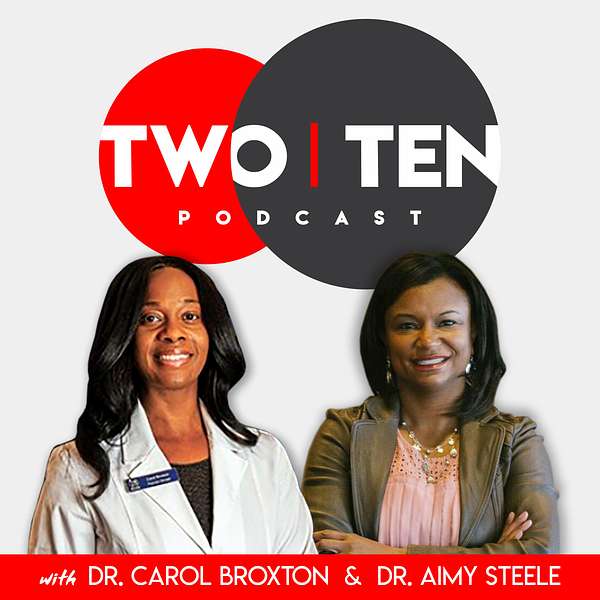
Two | Ten Podcast
This podcast exists to chronicle the lives and lived experiences of two professional mothers, who were married by 20, had professional careers, earned their Doctorate degrees, and each had 5 kids out of their own wombs! Carol and Aimy have unique experiences in this modern century in that they both still reached their goals and are still dreaming while being relatively young busy moms. Join them on their journey.
Two | Ten Podcast
Finances (Save, Spend, Give)
•
Dr. Aimy & Dr. Carol
•
Season 1
•
Episode 12
Use Left/Right to seek, Home/End to jump to start or end. Hold shift to jump forward or backward.
What's your financial story?
Some Statistics:
- Total consumer debt totaled $4.144 trillion in quarter three of 2019, a 4.7% increase from quarter three of 2018.
- Average consumer debt per capita is approximately $12,687 (total consumer debt as of November 2019/total US population as of January 9, 2020).
- Total revolving consumer debt was $1.083 trillion in November 2019
- Total revolving consumer debt rose 3.8% between quarter three of 2018 and quarter 3 of 2019.
- Average revolving debt per capita is approximately $3,299 (total consumer debt as of November 2019/total US population as of January 9, 2020).
- One in ten adults says they carry a credit card balance over $5,000. [Source: NBC]
- Total non-revolving consumer debt was $3.089 trillion in November 2019.
- Student loans totaled $1.636 trillion in September 2019.
- Auto loans totaled $1.189 trillion in September 2019.
- Average loans per student equal approximately $82,170 (total student loans in September 2019/total students enrolled in public or private universities in 2019)*Resource: https://www.lexingtonlaw.com/blog/loans/consumer-debt-statistics-2019.html
Budget
- Making monthly calendars full of bills and income
- Open up the mail as many people avoid opening up their mail
- Cash envelopes for budgeted amounts
- Every Dollar is a resource (Dave Ramsey/Rachel Cruze
Resources:
-His/Her Money Podcast
-Dave Ramsey, 7 Baby Steps
- Save $1,000
- Debt Snowball, Pay off all consumer debt less the house
- Save 3-6 months of living expenses
- Invest 15% of household income in retirement
- Save for children’s college fund
- Pay off home early
- Build wealth and give
Tips: (Save, Spend, Give, Earn)
- Spend less than you earn
- Have a side hustle
- Delay instant gratification
- Cut bills
- Use a coin jar
- Automatically save from a bank account on payday or weekly
- Side hustles (DoorDash, Uber, Poshmark, PT Job, What gifts do you have)
- Work more hours on your regular job
- Automatically invest each week
- Get kids, nieces and nephews investment accounts for birthdays with $25 in them and add $5 per week or month to them.
Music Credit: Mitchell Huntley, Power of Love, “Freestyle".
What's your financial story?
Some Statistics:
- Total consumer debt totaled $4.144 trillion in quarter three of 2019, a 4.7% increase from quarter three of 2018.
- Average consumer debt per capita is approximately $12,687 (total consumer debt as of November 2019/total US population as of January 9, 2020).
- Total revolving consumer debt was $1.083 trillion in November 2019
- Total revolving consumer debt rose 3.8% between quarter three of 2018 and quarter 3 of 2019.
- Average revolving debt per capita is approximately $3,299 (total consumer debt as of November 2019/total US population as of January 9, 2020).
- One in ten adults says they carry a credit card balance over $5,000. [Source: NBC]
- Total non-revolving consumer debt was $3.089 trillion in November 2019.
- Student loans totaled $1.636 trillion in September 2019.
- Auto loans totaled $1.189 trillion in September 2019.
- Average loans per student equal approximately $82,170 (total student loans in September 2019/total students enrolled in public or private universities in 2019)*Resource: https://www.lexingtonlaw.com/blog/loans/consumer-debt-statistics-2019.html
Budget
- Making monthly calendars full of bills and income
- Open up the mail as many people avoid opening up their mail
- Cash envelopes for budgeted amounts
- Every Dollar is a resource (Dave Ramsey/Rachel Cruze
Resources:
-His/Her Money Podcast
-Dave Ramsey, 7 Baby Steps
- Save $1,000
- Debt Snowball, Pay off all consumer debt less the house
- Save 3-6 months of living expenses
- Invest 15% of household income in retirement
- Save for children’s college fund
- Pay off home early
- Build wealth and give
Tips: (Save, Spend, Give, Earn)
- Spend less than you earn
- Have a side hustle
- Delay instant gratification
- Cut bills
- Use a coin jar
- Automatically save from a bank account on payday or weekly
- Side hustles (DoorDash, Uber, Poshmark, PT Job, What gifts do you have)
- Work more hours on your regular job
- Automatically invest each week
- Get kids, nieces and nephews investment accounts for birthdays with $25 in them and add $5 per week or month to them.
Music Credit: Mitchell Huntley, Power of Love, “Freestyle".
Support the show (https://www.facebook.com/TwoTenPodcastAC/)